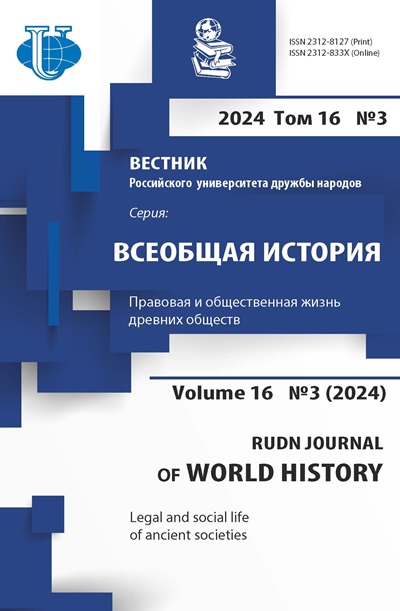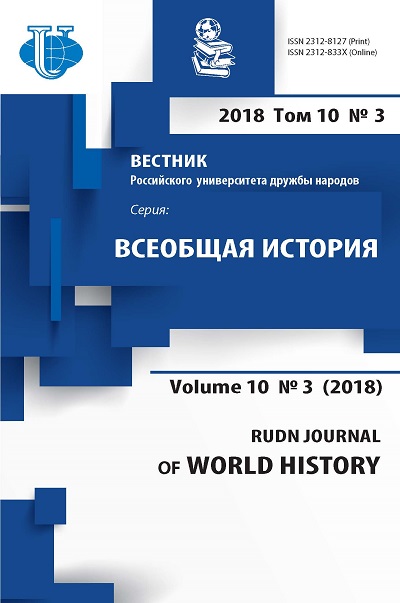Origin of Spartan kings from Heracles
- Authors: Darvin A.L.1
-
Affiliations:
- Saint-Petersburg State University
- Issue: Vol 10, No 3 (2018)
- Pages: 237-249
- Section: Antique world
- URL: https://journals.rudn.ru/world-history/article/view/20673
- DOI: https://doi.org/10.22363/2312-8127-2018-10-3-237-249
Cite item
Full Text
Abstract
The descent of Spartan kings from Heracles is considered to be the secondary myth interpretation about the “Return of the Heracledae”. It was associated with Dorian conquest of the Peloponnese in the ancient tradition (Tyrtaeus, Pindar, Herodotus, Isocrates, Ephor). The myth of the “Return of the Heracledae” is known to be one of the genealogical fiction what was invented in Argos and developed further in Sparta. There was a powerful argument for inheritance the rights of the royal title and performing the functions of the high priest in the community if the person was known as the descendant of Heracles belonging to the royal dynasties (Agiades and Euripontides). Apart from that, the power of Spartan kings outside Sparta could be justified if they were related to Heracles. In addition, this belonging to the descendants of Heraclides was above everything. It was one of the most important propaganda arguments to substantiate the legitimacy of the possession of conquered lands in Laconia and Messenia and provide “pro-Achaean” policy by the authorities of Sparta. However, the image of Heracles and his cult did not have the essential meaning in the religious life of the Spartan polis. The heavenly patrons of the kings were “divine twins” - the Dioscuri (Tindaridae). To conclude, it seems to be very controversial that the philosophical and ethical image of Heracles (as the main cynic hero) had a great influence on the representatives of the royal diarchy of the late classical and hellenistic periods.
About the authors
Alexey Leonidovich Darvin
Saint-Petersburg State University
Author for correspondence.
Email: darvin.aleksey@yandex.ru
postgraduate student
7-9 Universitetskaya Emb., Saint Petersburg, 199034, RussiaReferences
- Andreev JuV. Dorijskoe zavoevanie. Istoricheskaiya problema v svete archeologii [Dorian conquest. Historical problem in the light of archeology]. Saint Petersburg: Nestor-Istorija Publ.; 2015. 222 p. (in Russ).
- Darvin AL. Dioskury kak mifologicheskii proobraz spartanskoi diarkhii [Dioscuri as a mythological prototype of the Spartan diarchy]. Mnemon. Issledovaniya i publikatsii po istorii antichnogo mira. Sb. statei. Vypusk 5. [Mnemon. Studies and publications on the history of the ancient world: collected articles. Issue 5]. Ed. by E. D. Frolov. Saint Petersburg: Saint Petersburg University Publ. 2006;(5): 375–388. (in Russ).
- Darvin AL. Sfer Borisfenit i reformatorskoe dvizhenie v Sparte (istoriografiya voprosa) [Sphaerus of Borisphen and the reformatory’s movement in Sparta (the historiography of the question)]. Mnemon. Issledovaniya i publikatsii po istorii antichnogo mira. Sb. statei. Vypusk 2 [Mnemon. Studies and publications on the history of the ancient world: collected articles. Issue 2]. Ed. by E. D. Frolov. Saint Petersburg: Saint Petersburg University Publ. 2003;(2): 171–190. (in Russ).
- Pechatnova LG. Istoriya Sparty (period arkhaiki i klassiki) [The history of Sparta (the archaic and the classical period)]. Saint Petersburg: Gumanitarnaya Akademiya Publ.; 2001. 510 p. (in Russ).
- Pechatnova LG. Spartanskie tsari [Spartan kings]. Moscow: Yauza, Eksmo Publ.; 2007. 352 p. (in Russ).
- Africa Th. Philarchus and the Spartan revolution. Berkeley: University Press; 1961. 92 p.
- Baltrusch E. Sparta. Geschichte, Gesellschaft, Kultur. München: C. H. Beck; 1998. 128 s.
- Carlier P. La royaute en Grece avant Alexandre (Ouvrege publie avec le concours du Centre National des Lettres). Strasburg: AECR; 1984. 562 p.
- Cartledge P. Spawforth A. Hellenistic and Roman Sparta: A tale of two cities. London: Routledge; 2001. 328 p.
- Ehrenberg V. Nabis (1; 2). In: Pauly’s Realencyclopädie der classischen Altertumswissenschaft. Neue Bearbeitung. 1. Reihe. 1935; XVI(Hbbd. 32): 1471–1482.
- Grunauer-von Hoerschelmann S. Die Münzpragung der Lakedaimonier (Antike Münzen und Geschnittene Steine VII). Berlin: Walter de Gruyter; 1978. 229 S.
- Höistad R. Cynic Hero and Cynic King: Studies in the Cynic Conception of Man. Uppsala: Carl Bloms; 1948. 234 p.
- Huttner U. Die politische Rolle der Heraklesgestalt im griechischen Herrschertum. Stuttgart: Franz Steiner Verlag; 1997. 385 S.
- Lübker F. Reallexikon des klassischen Altertums für Gymnasien. 5. Auflage, hrsg. von Max Erler. Leipzig: Verlag B. G. Teubner; 1877. 1272 S.
- Malkin I. La mediterranee spartiate. Mythe et territoire. Paris: Les Belles Lettres; 2004. 395 p.
- Niese B. Zur Verfassungsgeschichte Lakedämons. Historische Zeitschrift. 1889;(62): 58–190.
- Parker R. Spartan religion. In: Powell A, editor. Classical Sparta: techniques behind her success. London: Routledge; 1989. p. 142–172.
- Richer N. La religion des spartiates. Croyances et cultes dans l’Antiquite. Paris: Les Belles Lettres; 2012. 806 p.
- Texier JG. Nabis (Annales litteraires de l’Universite de Besanson. Centre de recherches d’histoire ancienne 14). Paris: Les Belles Lettres; 1975. 111 p.
- Tigerstedt E. The Legend of Sparta in classical Antiquity. Vol. 1. Stockholm: Almquist & Wiskell; 1965. 526 p.
- Walbank FW. A historical commentary on Polibius. Oxford: Oxford University Press; 1957. 804 p.













